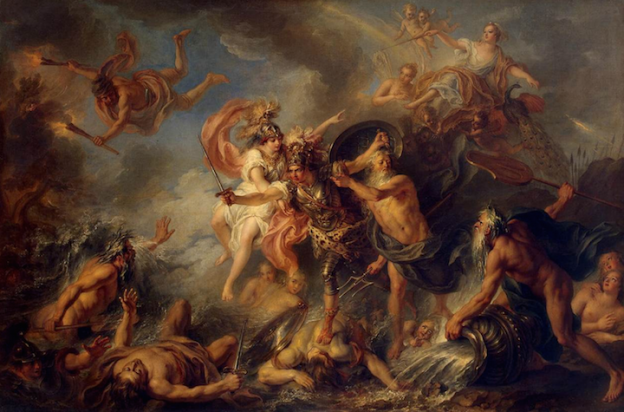“Engine” and “Engineer” are only used a total of three times throughout Troilus and Cressida. Yet each use enfolds layers of hidden meaning through which Shakespeare’s voice can be heard.
One instance of “engineer” especially stands out in 2.3 when Thersites enters the stage alone to deliver a soliloquy, complaining about Ajax and Achilles. Thersites enters the play in the third act, but as soon as he is on stage, the audience hears constant complaints and insults from him. As a result, he is not the most pleasant character — yet this very unpleasantness only emphasizes Shakespeare’s message.
After ranting about Ajax, Thersites switches topics to complain about Achilles: “Then there’s Achilles, a rare engineer” (2.3.7). He continues on the topic of Ajax and Achilles: “If Troy be not taken till these two undermine it, the walls will stand till they fall of themselves” (2.3.7-8). Achilles is a “rare engineer,” indeed, if, despite his military efforts, he can not benefit the siege of Troy in any way. This is what Thersites is claiming through this exaggeration; Achilles is so useless that the walls of Troy will erode by natural causes before Achilles takes the city of Troy. This interpretation or reading depends, however, on the following definition of “engineer”: “A person who makes engines, structures, or systems” (OED – Definition I). or more specifically “a person who designs and constructs military works for attack and defense” (OED – Definition I1a). This literal definition better describes Achilles’ position in the Greek army. He was a commander and thus in charge of devising strategy in order to win battles in the siege of Troy. Thus, when Thersites calls him a “rare engineer” he is highlighting the lack of competence Achilles has been demonstrating.
However, another definition of “engineer” is clearly insinuated in Thersites’ language. As noted in the footnotes of the Pelican edition of the play, “rare engineer” can also mean “exceptional plotter,” lending meaning from the definition: “A person who contrives a scheme” (OED – Definition II) or more specifically: “An author or designer of something; a plotter, a schemer” (OED – Definition II.5). This deeper meaning within the word demonstrates the complexity of Achilles as a character as well as Thersites. Achilles is portrayed not just as an incompetent commander, but as a complex character with knowledge of his actions and hidden purpose. Thersites claims he is a schemer. In other words, he has personal interest that he is putting before the army’s interests. This contrasts sharply with how Achilles is portrayed in Shakespeare’s era as a hero of the Trojan War. By use of “engineer,” Shakespeare points the listener or reader to two different definitions that only highlight the flaws of so-called “heroes” such as Achilles. (See featured image for a depiction of the “hero” Achilles).
Also, through the use of “engineer,” Shakespeare demonstrates Thersites as a character who is self-aware. This is why Thersites can not be read only as an unsympathetic character; Thersites’ manner is only a consequence of the ineptitude surrounding him. He has not choice but to react negatively when he is surrounded by an unnecessary war such as he is. In this sense, Thersites’ speeches are excellent modes through which Shakespeare can voice his own cynical opinions about the war itself.
“Engineer” does not arise anywhere else in the play, yet “engine” does in the same general context. It is also interesting to look at the use of “engineer” as a verb, as it only stressed the contrast between the two different definitions discussed above. For example, one definition states: “To use specialized knowledge or skills to develop (a complicated system or process) so as to fulfill specified criteria or perform particular functions” (OED – Verb Definition 3a). Thersites use of “engineer” to describe Achilles is thus clearly ironic, as Achilles fails to fulfill his function as a commander of the Greek army.

